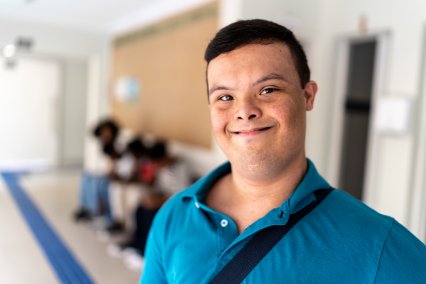Free Designing For Everyone accessibility toolkit
Our free Designing for Everyone kit gives primary care staff the chance to assess your environments and make them better for everyone. Complete the form below to access the toolkit.

The tools can be used by practice managers, premises teams and patient groups to better understand how the design and layout of your health centre building works for people with a range of needs.
The toolkit was commissioned by primary care building specialists Assura PLC and written by the Association for Dementia Studies at the University of Worcester based on Dimensions research.
Complete the form to access the Designing For Everyone toolkit
Or read on for more details.
Please note; permission to undertake the assessment must be obtained from the health centre/GP practice before using any of the tools.
More details
It’s believed to be the first integrated resource of its kind to focus specifically on design principles to support people living with dementia, neurodiversity and conditions like anxiety. The tools can play a vital part in patient experiences, engagement with health services and reducing inequality of access to care.
It draws on research into best practice design for people living with dementia, neurodiversity and conditions like anxiety and earlier studies with Assura by Dimensions and forms part of our suite of training resources for general practice in our #MyGPAndMe campaign.

“It’s crucial that people with learning disabilities and/or autism have the opportunity to access effective healthcare while maintaining their independence, dignity and comfort. But at the moment, inadequate building designs and patient environments are hindering this accessibility. The toolkit will address this and allow health centres to care for every patient in an inclusive, welcoming atmosphere.”
It follows Dimensions’ 2019-20 research with disabled people on their experiences of primary care buildings. It found:
- Just 22% of respondents feel independent in health centre environments.
- Less than half of respondents felt that toilet facilities in health centres met their needs.
- Almost half of all respondents feel worried in health centre environments – with décor, lighting, noise levels and waiting room layout all highlighted as factors that affect how people feel.
- Increased training, awareness, skills and knowledge are needed to support people with disabilities in primary care environments.

“We cannot simply shrug our shoulders at the fact that the design of many older primary care buildings can be particularly difficult for people with disabilities, dementia and neurodiverse conditions – and can even impact on whether people who are most in need of local health services access them at all.”
It also highlights some of the challenges raised in the government’s National Disability Strategy, which noted ‘visiting the GP surgery’ as a key issue for people living with disabilities:
“Of those disabled people who had found difficulty accessing public buildings at least ‘sometimes’, about three quarters had experienced at least some difficulties accessing health services (78%)…Access to healthcare services appears to have been particularly impacted by the COVID-19 pandemic – disabled people more often indicated coronavirus had affected access to healthcare for non-coronavirus related issues than non-disabled people (40% compared with 19%).”
The toolkit will also be rolled out by Assura in its approach to designing new primary care buildings and delivering extension and improvement works to existing sites around the country.

“Health centres are where the most patient contact in the NHS takes place. Designing for Everyone will enable the physical environment to be more supportive of all patients who attend clinics and will support staff in delivering high quality patient-centred care."
Complete the form to access the Designing For Everyone toolkit
Please note; permission to undertake the assessment must be obtained from the health centre/GP practice before using any of the tools.





